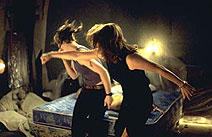|
|
|
|
The
Business of Strangers
|
 |
|
There two good reasons to see this film: Stockard Channing and Julia Stiles. Happily, one or both of these superb actors is on screen for every moment of this modestly scaled drama. The story taps into modern neuroses about the destiny of career women. Julie (Channing) and Paula (Stiles) represent not only two generations but also two styles of professionalism. Where Julie has obviously sacrificed and repressed much in her corporate rise, Paula is compelled to test the limits of most situations. Both, however, exude a disquieting psychology that mixes cunning with alienation. Stranded in an airport between flights, Julie decides to befriend Paula, whom she has sacked as an assistant previously in the day. Their interaction shifts into an ambiguous and risky realm once Nick (Frederick Weller), who may or may not have known Paula years before, is drawn into their power games. This is fundamentally a piece of filmed theatre. It relies heavily – too heavily – on the qualities of its setting. The airport is a cold, impersonal construction, with its glass elevators, conference corners and dishevelled hotel rooms still under construction. It is a tale of one-upmanship, in which the characters goad each other into dangerous and thrilling acts, and then spend much time gazing (like Dustin Hoffman at the end of The Graduate) blankly into space, wondering if they have lost their humanity along the way. The trajectory is familiar and the moves often facile, but Channing and Stiles bring the piece alive. Debut writer-director Patrick Stettner has the good sense to keep his style simple and observational, giving these players all the time and room they need to work through myriad gear-shifts of mood and emotion. For all its genuflection to the latest log-lines in pop sociology, The Business of Strangers feels like a movie from another era. But which era, exactly? A film buff's mind is likely to rifle back through Robert Altman's Three Women (1977), Robert Aldrich's What Ever Happened to Baby Jane? (1962) and, ultimately, bygone melodramas like The Great Lie (1941). All these are politically incorrect stories of women at loggerheads with each other, and all are about the wrenching realities of ageing. The most exciting aspect of the face-off between proud Julie and flighty Paula is its rediscovery of this hot, subterranean theme. MORE Stiles: Save the Last Dance © Adrian Martin May 2002 |
![]()